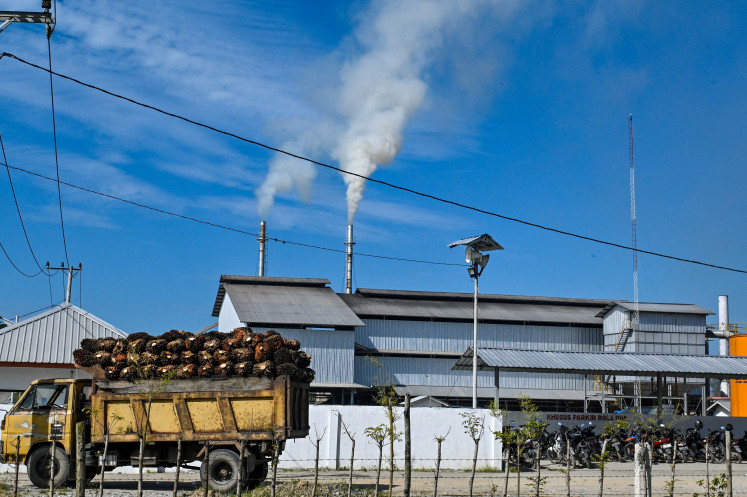Popular Reads
Top Results
Can't find what you're looking for?
View all search resultsPopular Reads
Top Results
Can't find what you're looking for?
View all search resultsFarmers need a hand: Minister
Despite the massive potential of Indonesia’s agriculture industry, farmers still face many difficulties gaining access to capital from banks, a minister says
Change text size
Gift Premium Articles
to Anyone
Despite the massive potential of Indonesia’s agriculture industry, farmers still face many difficulties gaining access to capital from banks, a minister says.
“The banking sector is still reluctant to provide credit to farmers. This is a pity because Indonesia is one of the world’s major players in terms of its agricultural commodity industries,” Agriculture Minister Anton Apriyantono said at the launch of an agriculture expo event last Friday.
According to the Bank Indonesia website, last year the Indonesian banking sector extended around Rp 236.8 trillion (US$19.75 billion) in loans to the agriculture industry. This amount represents around one-third of the total loans disbursed by the bank (around Rp 736 trillion).
Despite these seemingly respectable proportions, last year’s loans to agriculture businesses — largely channelled into the country’s top export commodities — in fact represent a decline from the 2007 total of Rp 237.7 trillion, defying the more than 30 percent growth in loans disbursed overall from 2007 to 2008.
In the end, credit difficulties hinder local middle-up scale businesses from investing in or venturing into the industry, Anton said.
“Indonesia has one of the biggest agriculture industries in the world, but there are only a few local middle-up scale business ventures that have invested in the industry.”
“Local businesses should realize that the huge potential of our agriculture industry could enable us to feed the world if we wanted to.”
During his speech at the expo, Adi Sasono, chairman of the Indonesian Cooperatives Council (Dekopin), shared Anton’s sentiments, saying that the agriculture industries needed to start thinking of the bigger picture.
“Now is not a time to think locally. Indonesia’s agriculture industry needs to start thinking about how we can become the top regional players,” Adi said.
“We have more than enough natural resources for the bio-energy industry and organic farming, both of which are growing trends worldwide. That is why it is important for the government to push for easier access to credit in the real sectors, especially in the agriculture sector.”
According to Ryan Kiryanto of Bank Negara Indonesia (BNI), there are several factors that can prevent banks from choosing to provide loans to farmers.
“Banks may feel reluctant to give out loans after reviewing the worthiness or business prospects of proposals submitted. If there are legal documents or collateral missing it can make banks less willing,” he said.
“However, these issues can be resolved through partnerships between the farmers and middle-up business ventures. Those business ventures would become the ones guaranteeing the collateral of loans.”
Guaranteeing the sustainability of farming land is also another major problem facing the industry.
In 1986, the Agriculture Ministry recorded 7.7 million hectares of rice paddies in Indonesia. By 1996 there had only been a slight increase in that amount, to 8.25 million hectares, but by 2000 the total had dropped back to 7.79 million hectares.
Lawmakers are currently working on passing a bill which aims to protect the sustainability of agricultural lands and prevent farming zones from being used for industrial or commercial purposes. The bill would also contain clauses on the provision of easier access to bank loans so that farmers can borrow money to buy their own land. (hdt)










